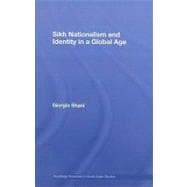
Note: Supplemental materials are not guaranteed with Rental or Used book purchases.
Purchase Benefits
Looking to rent a book? Rent Sikh Nationalism and Identity in a Global Age [ISBN: 9780415421904] for the semester, quarter, and short term or search our site for other textbooks by Shani; Giorgio. Renting a textbook can save you up to 90% from the cost of buying.
| List of figures | p. x |
| List of tables | p. xi |
| Preface and acknowledgements | p. xii |
| Abbreviations | p. xv |
| Introduction: rethinking Sikh nationalism in a global age | p. 1 |
| Ethno-symbolist approaches | p. 2 |
| Instrumentalist approaches | p. 4 |
| Constructivist approaches | p. 6 |
| Long-distance nationalism | p. 8 |
| Globalization, sovereignty and national identity | p. 9 |
| Rethinking Sikh nationalism | p. 11 |
| The structure of the book | p. 14 |
| From panth to qaum: the construction of a Sikh 'national' identity in colonial India | p. 17 |
| The Sikh panth: from Nanak-panth to Khalsa panth | p. 21 |
| The mythology and symbolism of the Khalsa | p. 24 |
| 'Singh-izing the Sikhs': the Tat Khalsa discourse and the colonial state | p. 26 |
| The institutionalization of a 'Sikh' identity: from the CKD to the SGPC | p. 35 |
| Conclusion | p. 39 |
| The territorialization of the qaum: Sikh 'national' identity in independent India | p. 40 |
| The Nehruvian secular settlement | p. 41 |
| The Shiromani Akali Dal (SAD) and the movement for the Punjabi Suba | p. 43 |
| The 'violence' of the Green Revolution and Sikh 'kulak' nationalism | p. 48 |
| Imagining Khalistan | p. 51 |
| The 'communalization' of the Punjab and state terrorism | p. 53 |
| The militarization of the qaum | p. 56 |
| Conclusion | p. 58 |
| From Khalistan to Punjabiat: globalization, Hindutva and the decline of Sikh militancy | p. 61 |
| Economic liberalization in India | p. 62 |
| Rebranding India: the challenge of Hindu nationalism | p. 66 |
| Globalization, regionalism and the 'new democratic alignment': an analysis of the 2004 elections | p. 71 |
| Globalization, the SAD-BJP alliance and the reassertion of Punjabi identity in post-Blue Star Punjab | p. 73 |
| Conclusion | p. 77 |
| 'The territorialization of memory': Sikh nationalism in the 'diaspora' | p. 79 |
| A Sikh diaspora? | p. 80 |
| The Sikh nationalist discorse in the diaspora | p. 82 |
| Partition | p. 86 |
| 'Operation Blue Star' | p. 94 |
| Conclusion | p. 98 |
| The politics of recognition: from a Sikh 'national' to a Sikh 'diasporic' identity in a post-9/11 world? | p. 100 |
| Location and identity: the dynamics of Sikh diaspora nationalism | p. 102 |
| Britain: from 'nation-state' to 'community of communities'? | p. 105 |
| Who are we? Khalistan, 9/11 and Sikh-American identity | p. 114 |
| Conclusion | p. 125 |
| Beyond Khalistan? The Sikh diaspora, globalization and international relations | p. 128 |
| The Westphalian order and IR theory | p. 129 |
| 'A revolt against the West': the global religious resurgence | p. 132 |
| Beyond Westphalia? Globalization, transnational religious communities and international relations | p. 133 |
| Serving the qaum: Sikh transnational religious actors | p. 137 |
| Beyond Khalistan? Voices from the diaspora | p. 142 |
| Concluding remarks | p. 149 |
| Conclusion | p. 152 |
| Full questionnaire results (India) | p. 157 |
| Notes | p. 161 |
| Bibliography | p. 173 |
| Index | p. 195 |
| Table of Contents provided by Ingram. All Rights Reserved. |
The New copy of this book will include any supplemental materials advertised. Please check the title of the book to determine if it should include any access cards, study guides, lab manuals, CDs, etc.
The Used, Rental and eBook copies of this book are not guaranteed to include any supplemental materials. Typically, only the book itself is included. This is true even if the title states it includes any access cards, study guides, lab manuals, CDs, etc.